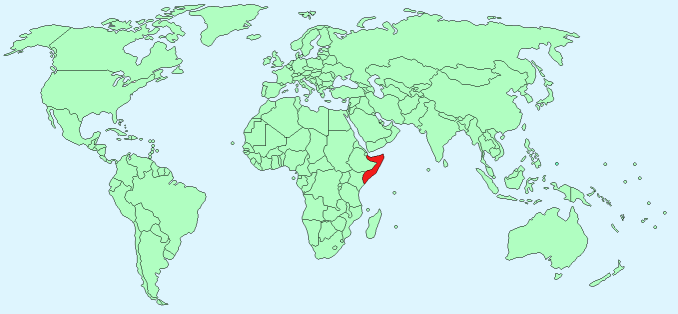
Somali
The Somali community in Wisconsin is principally concentrated in the northern region of the state near Barron. Below, we will trace the history of some of these Somali-speaking individuals and how they have been welcomed into the community.

Language
Somali is a term used to describe a language as well as people with roots in Somalia. Somali is not exclusively spoken in Somalia, as conflict-driven movement especially has pushed people into other neighboring nations. Somalia is a former colony of Italy, and as such, many university courses were taught in Italian and many do have a proficiency in the language. Arabic is also considered an official language.
Learn Somali Words and Phrases!
Soo Dhawoow — Welcome
Subax Wanaagsan — Good Morning!
Sources:
View other videos from this channel: https://www.youtube.com/channel/UCha4GFsqmoWEd4PcAon9x4w/featured
1960-1991
Somalia gained freedom from Italian and British rule in 1960. Over the next 30 years, the country would be marked by political instability and violent combat, some 300,000 individuals losing their lives. Aden Adde was the nation’s first president.
1991
The tipping point came in 1991 when the nation descended into full-blown civil war. Longtime President Siad Barre was ousted and forced into exile.
“As a result of the devastating Somali Civil War, approximately two million Somalis sought refuge in neighboring African nations and abroad. The massive death toll to Somalis—with some estimates as high as 500,000 (White 2012)—came about due to violence and also blockades of refugee camps. The war became an international issue in 1992 when twenty four nations deployed military troops with the purpose of subduing violence and aiding food supplies (Yusuf 2012). Eventually, the United States withdrew its troops from Somalia following the Battle of Mogadishu, and then opened up its borders to asylum seekers.”
1990’s
The Twin Cities in Minnesota became the de facto capital of Somalis in the U.S. Although the weather was quite an adjustment, it was attractive due to its well-established refugee support network and job opportunities. There was a big push to open restaurants and cultural centers to welcome these new individuals into the community.
Late 1990’s
Job opportunities started to decline in the Twin Cities, and Wisconsin, Barron specifically, started looking like a more attractive option on several counts. For one, the graduation test requirements in Wisconsin weren’t as strict as Minnesota. The smaller city environment felt safer, was cheaper, and it had a Jennie-O Turkey factory in need of labor. The transition wasn’t seamless, and there certainly were needs and accommodations that Barron didn’t have the resources to fully provide (housing, language services, and familiar grocery options to name a few), but the community did their best to welcome their new guests.
Post-9/11
Just as the community was starting to connect and better understand the Somali population, 9/11 hit and anti-Muslim tensions rose to an all-time high. In 2002, the International Center opened with the goal of providing resources and information to those living in Barron and the surrounding areas.
Islam is the official religion of Somalia and those who practice the religion of Islam are called Muslims. Some 99% of Somalis identify as Sunni Muslim. For many followers, they pray five times a day and will fast during daylight hours in the month of Ramadan.
School
Schools have been asked to do a lot, and while everything hasn’t been perfect, the school district has become a central place for connection and understanding among residents. Soccer has been a uniting sport, and a non-high school-affiliated club has been established as well. At first, most of the children were in high school, but now the number of Somali students in the younger grades is expanding as well.
Community members have been able to find jobs working as bilingual aides in the schools, and non-Somali teachers and staff have worked to create inclusive spaces, such as a designated prayer room. They provide familiar foods at meals and label ingredients that may not be allowed due to their religion.
Barron also has an Adult Literacy Council that helps provide ESL classes.
Image Credit to Josh Brown
Immigrant Advocates Barron County
I have had the privilege of working alongside the incredible individuals behind IABC. They do not solely focus on matters related to Somali individuals, but as of recent they have been working tirelessly to address family reunification. They recently created a documentary that tells the story of some of the people living in their community.
See their website linked below to learn about how you can support their efforts.
https://sites.google.com/view/immigrantadvocatesbarroncounty/
Further Reading
Refugee Resettlement In Wisconsin, By The Numbers
Somali separation: Part 1 — Barron residents speak up in hopes of reuniting families
Changes needed to help refugees in Wisconsin access higher education
CCWT Webinar Series — Refugees and Higher Education
What A National Decline In Refugee Resettlement Looks Like For Wisconsin
The Changing Faces Of Wisconsin's Foreign-Born Residents
Barron City Council Election Features First-Ever Somali Candidate
Refugee Resettlement In Wisconsin Leveled Off In 2019
“I see myself as someone who knows both cultures—American and Somali.”
“When I came back to America, I became more confident in who I was.”
Somalis find home in Barron, Wisconsin
Somali Immigrant Experiences in Barron County
Ho-Chunk Tribal Member Creates Film About Area Somali Immigrants and Family Separation Stories









